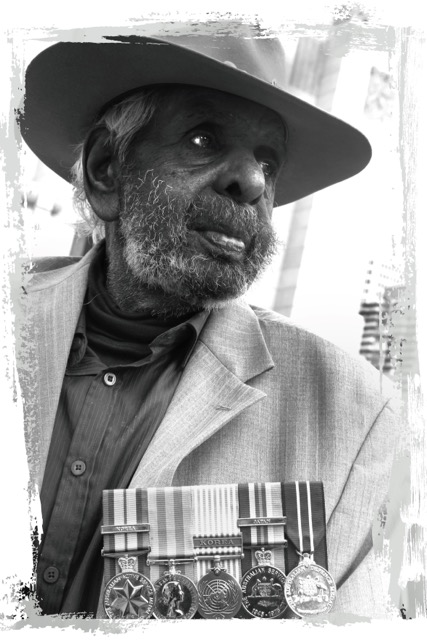Stephen Mullawalla Dodd – deceased
Arrente (Central Australia)
Retired Private
1st Battalion, Royal Australian Regiment
Royal Australian Infantry Corps
Australian Army
Korean War Veteran
Medals and Awards
Australian Active Service Medal 1945-75 – Korea
Korea Medal
United Nations Service Medal (Korea)
Australian Service Medal 1945-75 – Japan
Australian Defence MedalJimmy Little Lifetime Achievement Award, 19th Deadly Awards (2013)
I am a Arrente man from Central Australia and as a young man, I worked as a stockhand on cattle stations as a horse breaker and was also a rodeo rider. I got to appear at rodeos in many states and was a member of the Rough Riders’ Association for many years. I used to sing and play guitar too – mainly country and western and folk music too. This led me to respond to casting calls for Aboriginal actors which I was natural at because I loved films and I loved acting. The first film I was in was in 1946 and it was ‘The Overlanders’ (1946) which was produced by Ealing Studios. I’d been working on the set when Chips Rafferty noticed me and he opened the door for me to do a small part. This led to more roles being offered. I was in such ‘Bitter Springs’ (1950) and I went to Britain and the US with Ealing Studios.
But I put my acting career on hold, and signed up for active service in the Korean War. After returning from active duty, I went back to my acting career and appeared in several films. These films explored issues facing Aboriginal and Torres Strait Islanders such as land rights and race relations. I was in a supporting role in ‘The Chant of Jimmie Blacksmith’ (1978) and had the lead role in ‘Ground Zero’ (1987) – a thriller based on claims that Aboriginal and Torres Strait Islanders were used as human guinea pigs in the British nuclear tests at Maralinga during the 1980s.
By 1985, I had acted in 55 movies or television features. The Deadly Awards departed from tradition in 2013 when they presented me with his Lifetime Achievement Award. Generally, the award is not presented to someone who was not primarily a musician. However, the organisers described me as “an actor that created a pathway for others across the entire arts and music sectors to follow, at a time when typecasting stereotypes and discrimination was the ‘norm’ in Australia’s arts industry”.
I served my country at war and at home. Being recognised is difficult, I am proud of being seen as a trailblazer in an industry in which it is notoriously difficult to succeed for anyone, even more so if you are Aboriginal.’
